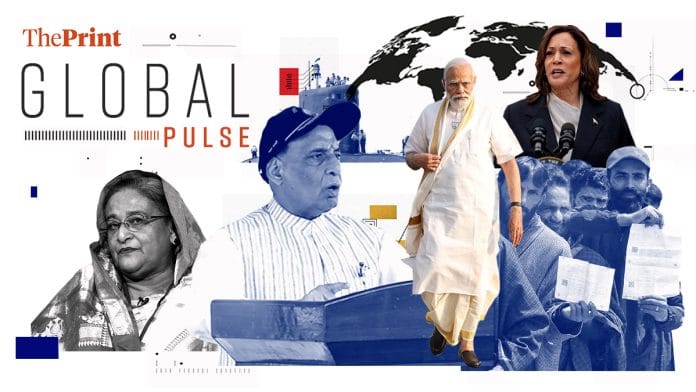New Delhi: India Thursday commissioned INS Arighat (S-3), a nuclear-powered ballistic missile submarine, in Visakhapatnam. This 6,000-tonne vessel, equipped with K-15 nuclear ballistic missiles boasting a range of 750 km, marks a significant step in India’s maritime capabilities. Its deployment underscores India’s intention to bolster its long-range patrols across the Indo-Pacific region, as detailed by Liu Xuanzun of Global Times.
The addition of the INS Arighat to India’s naval fleet not only enhances its deterrence capabilities but also strategically positions India amid growing regional tensions. The Global Times notes that with two such submarines now in operation, India can exert considerable strategic leverage.
This development serves as a countermeasure to any naval power attempting to assert dominance in the Indo-Pacific, a region where India’s geographical positioning places it at a pivotal juncture. Chinese experts have advised India to wield this growing nuclear capability responsibly, suggesting that such power should be leveraged to uphold peace and stability rather than to project military strength.
In Bloomberg, Sudhi Ranjan Sen explains that the operationalisation of nuclear-powered submarines like the INS Arighat will enhance India’s ability to launch nuclear strikes from sea, air, or land. Unlike conventional diesel-electric submarines, which require periodic surfacing to recharge their batteries, nuclear-powered submarines can remain submerged for extended periods, significantly reducing their visibility and vulnerability.
Simultaneously, India continues to adhere to its “no first use” policy regarding nuclear weapons, a stance formalised after its 1998 Pokhran-II nuclear tests. This policy dictates that India will not initiate nuclear conflict but will respond with nuclear force if attacked.
On the political front, Jammu and Kashmir is preparing for its first regional elections in a decade, a development that aims to reinstate a local assembly after a prolonged period of direct rule from New Delhi. This electoral process is set against a backdrop of heightened militant activity and political unrest that has followed the abrogation of Article 370 in August 2019, as highlighted by Aijaz Hussain in an Associated Press article.
The elections, slated to take place from 18 September to 1 October, will reintroduce a local government structure in the region, albeit with limited authority and no impact on Kashmir’s status as a Union territory. The region has been without a local government since the Bharatiya Janata Party abruptly ended its coalition with the People’s Democratic Party in 2018.
For political figures in Kashmir, this election represents a critical opportunity to express dissatisfaction with Prime Minister Narendra Modi’s policies. However, scepticism persists among the populace due to a history of contentious and allegedly rigged elections in the region.
Meanwhile, after a four-year hiatus following the deadly 2020 Galwan Valley clash, Chinese investment in India is resuming. An inter-ministerial panel in India has recently approved six new proposals, including investments from Chinese electronics giant Luxshare and a joint venture between Indian firm Bhagwati Products and Huaqin Technology. South China Morning Post’s Biman Mukherji notes that this easing of restrictions marks a significant shift in relations between the two nations, which had been strained by military confrontations.
Industry leaders in India have welcomed this development, arguing that reduced restrictions will bolster local manufacturing and better integrate India into the global supply chain. Vinod Sharma, chairman of the Confederation of Indian Industry’s national committee on electronics, commented, “China is the factory of the world and this will continue for some time. We want to be self-reliant and move from assembly to manufacturing of components.”
However, critics caution that increased dependency on China could undermine efforts to cultivate an independent technological base. The full implications of this renewed investment relationship remain to be seen.
On the diplomatic end, the India-Bangladesh relations are also changing abruptly. Prime Minister Narendra Modi hosted the country’s former PM Sheikh Hasina during the G20 Summit in September 2023. The counterparts discussed enhancing connectivity and commercial ties, exploring avenues for broader bilateral cooperation. Yet, less than a year later, Hasina’s 15-year rule in Bangladesh was abruptly ended by student protests, leading to her flight to India. This political upheaval has stoked anti-India sentiment in Bangladesh, with demands for Hasina’s extradition.
The interim Bangladeshi government’s decision to cancel Hasina’s diplomatic visa has further complicated her situation in India. Rumours of Indian involvement in the floods in Bangladesh and criticism over delays in Indian visa processing have added to the tensions. Political scientist Ali Riaz, in a discussion with writer Sarah Shamim, noted that India’s staunch support for Hasina amid allegations of human rights abuses has intensified discontent. Riaz argued, “India’s unqualified support for Hasina meant it had supported three fraudulent elections and egregious violations of human rights.”
PM Modi invited to Pakistan, Kamala Harris on her changing stance
Pakistan has invited Modi to the upcoming Shanghai Cooperation Organisation (SCO) meeting being held in Islamabad, said the Foreign Office spokesperson Mumtaz Zahra Baloch Thursday. Read the latest news report by the Dawn to know more.
In a CNN exclusive sit-down interview, US Vice-President Kamala Harris offered an explanation on why she has changed some of her positions on fracking and immigration, telling CNN’s Dana Bash her values haven’t shifted but that her time as vice-president provided new perspectives on some of the country’s most pressing issues. For details, click here.
Also read: Why Modi may need to do ‘extra asanas’ & lateral entry about-turn is a boost for Rahul Gandhi






